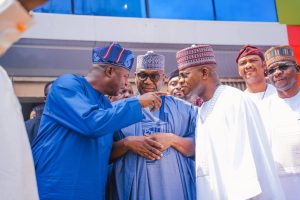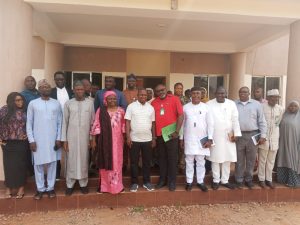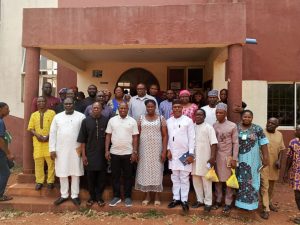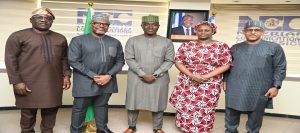Sani Musa, the Tax Reform Bill and the Wave of Posterity – By Abdullahi O Haruna Haruspice

In a time when fiscal policy often reads like a battleground of interests, the Tax Reform Bill stands out not only as a transformative piece of legislation but as a testament to the kind of strategic leadership the country desperately needs. And at the heart of this reform wave is Senator Sani Musa, Chairman of the Senate Committee on Finance—a figure whose quiet patriotism and tactical brilliance helped steer Nigeria through one of its most contentious legislative terrains in recent memory.
From the moment the bill surfaced, the Tax Reform Bill was dogged by controversies. Critics feared that the law, aimed at overhauling Nigeria’s outdated tax architecture, would tilt the scales too far in favor of the government, burdening the masses and small businesses in the name of fiscal sustainability. Industry players, policy wonks, and civil society groups raised alarm over the scope and speed of the proposed reforms, warning of unintended consequences on a fragile economy still reeling from inflation and unemployment.
Amidst this tempest, Senator Sani Musa emerged as a voice of balance—a custodian of both the nation’s treasury and its people’s economic well-being. His stewardship was not merely legislative; it was a strategic dance between diplomacy, data, and the defense of public interest.
Rather than bulldozing the bill through the Senate, Musa adopted a listening-first approach. Public hearings were expanded, stakeholder consultations intensified, and expert opinions invited. He understood that reforms this monumental required more than a rubber stamp; they needed legitimacy, both in content and perception. This approach defused much of the hostility and gave room for a more refined bill that ultimately addressed many concerns raised by taxpayers and businesses.
One of the major criticisms initially centered on the removal of the requirement to retain 1% of qualifying capital expenditure by upstream companies when computing annual allowances. Industry stakeholders feared this could increase their tax burden and discourage capital investment. But Musa’s committee insisted on the reform as a necessary move toward eliminating legacy loopholes and improving revenue transparency in the extractive sector. Still, it wasn’t forced down blindly—an array of compensatory provisions were discussed to balance the scales, showing his ability to negotiate a fair middle ground.
Another masterstroke under Musa’s watch was the replacement of the Pioneer Status Incentive with a more disciplined Economic Development Tax Incentive. For years, the Pioneer Status scheme had been riddled with abuse—serving as a shelter for tax avoidance more than a driver of innovation. Musa championed a system that would offer economic incentives without compromising regulatory oversight. The new framework proposed a more rigorous administrative and control mechanism, ensuring that incentives actually stimulate productive sectors, not just line corporate pockets.
Perhaps the most people-centered feature of the bill is the introduction of the Tax Ombud and the reestablishment of the Tax Appeal Tribunal. This was a bold move, and one that bears Musa’s trademark balance between government efficiency and citizen protection. The Tax Ombud offers a new path for redress, allowing taxpayers to challenge unfair treatment without expensive litigation. The Tax Appeal Tribunal, now empowered with broader jurisdiction over all tax matters, represents a monumental step in tax justice—giving voice to the ordinary business owner and shielding them from bureaucratic high-handedness.
Of course, the new regime is not without its complexities. The reformed laws will affect compliance obligations, technology requirements, and potentially the tax liability of businesses and individuals. For some, it means higher taxes; for others, it means navigating a more sophisticated but demanding reporting environment. It will require significant capacity-building across the tax chain—from FIRS officers to local tax administrators, from SME accountants to multinational CFOs.
But in all this, Senator Sani Musa’s role cannot be overstated. He didn’t just push a bill; he midwifed a tax culture renaissance. He understood that any reform not rooted in posterity is merely policy for policy’s sake. His work on the Tax Reform Bill is a testament to leadership that is firm but not arrogant, bold but not reckless—leadership that protects government revenue without sacrificing the average Nigerian’s dignity.
As the harmonisation process between the Senate and House of Representatives nears completion, the final version of the Tax Reform Bill will soon become law. When it does, analysts and citizens alike must remember the principled role played by Senator Musa. For in a system often criticized for legislative inertia or elite capture, he has shown that with the right mix of patriotism, pragmatism, and public service, Nigeria’s lawmakers can still leave legacies that ride the waves of posterity—not controversy.
Senator Sani Musa’s handling of the Tax Reform Bill offers more than policy reform; it offers a blueprint for national renewal. In a season of cynicism, he delivered not just a bill—but belief.
Posteritily musing








